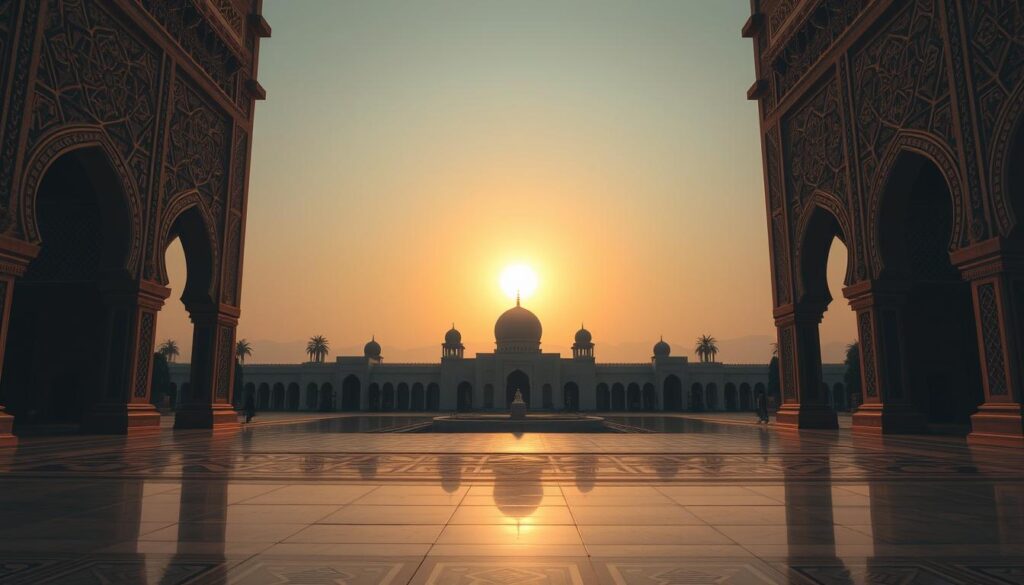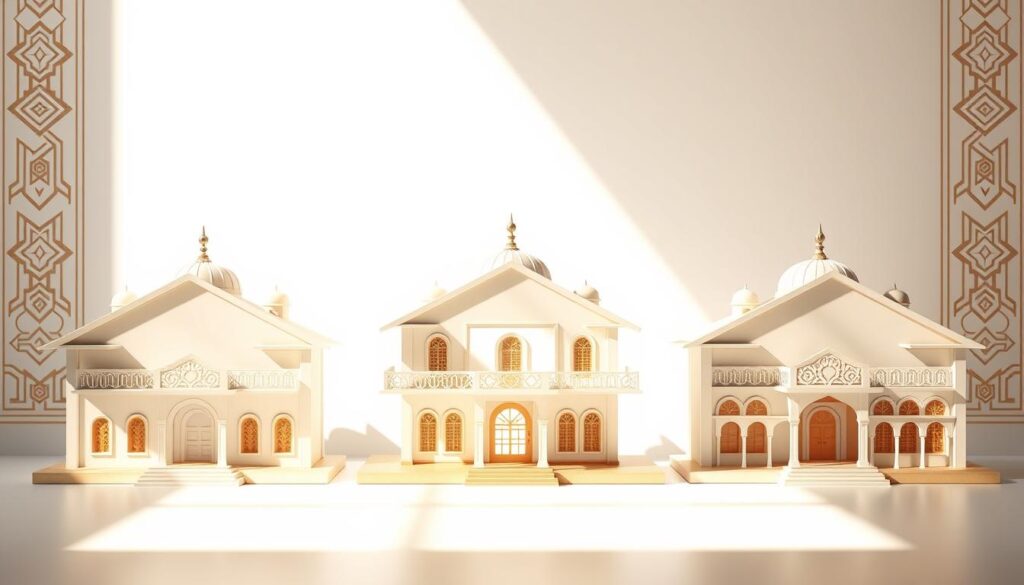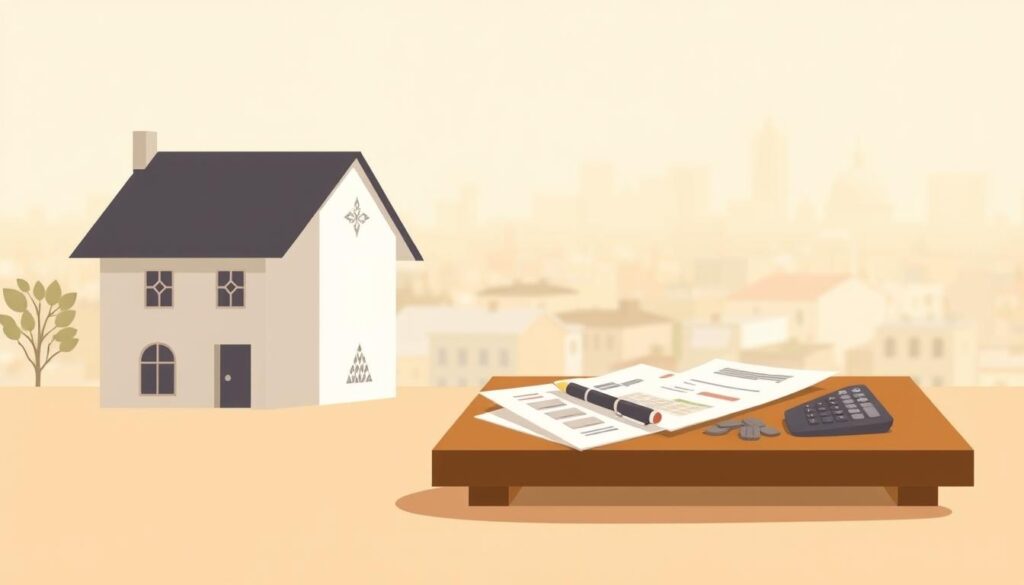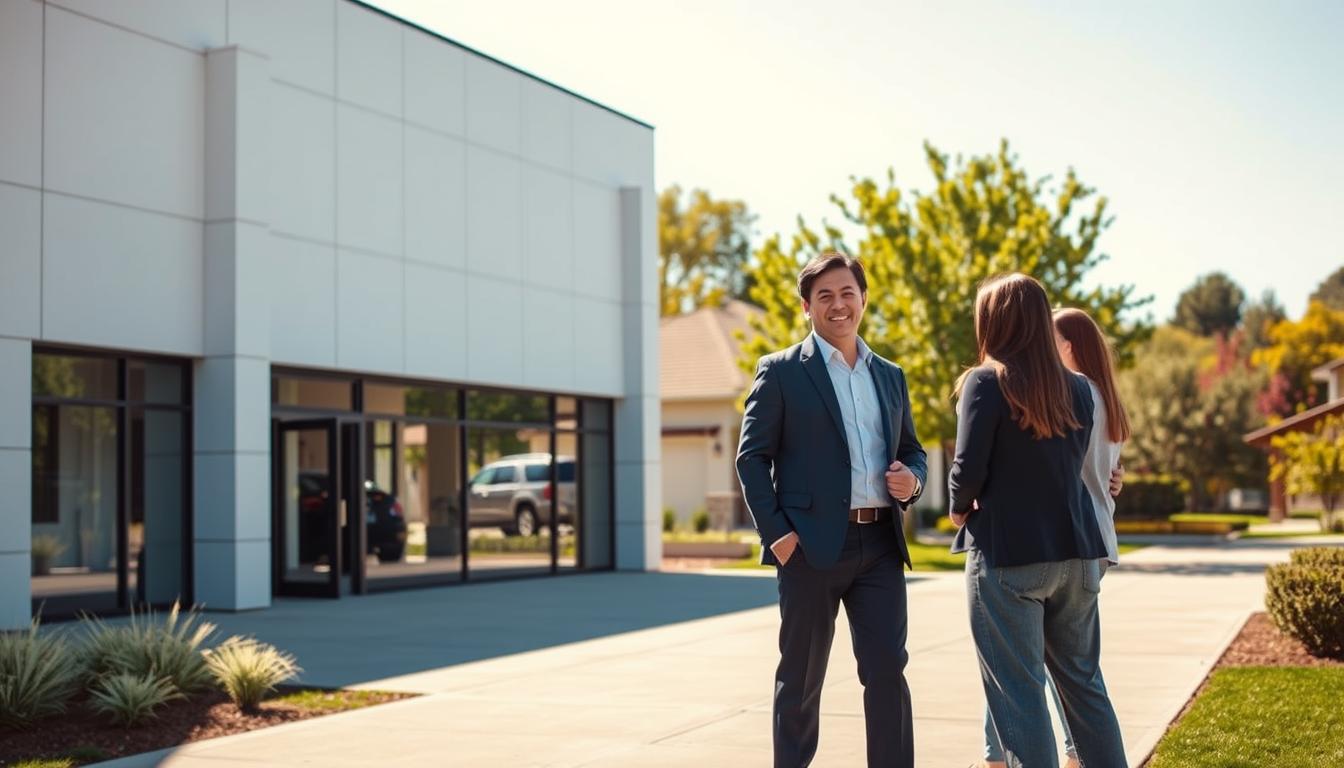Islamic home financing is a special way to own property that follows religious money rules. It doesn’t have interest payments, giving Muslim buyers a fair choice instead of regular mortgages.
A halal mortgage is a Sharia-compliant way to buy a home. It uses Islamic finance rules to make home buying fair and right. It’s different from regular mortgages because it follows strict religious rules.
In North America, Islamic home financing is getting more popular. Now, over 25 banks offer special mortgage products. These options help Muslim communities find banking that fits their values and beliefs.
Key Takeaways
- Halal mortgages eliminate interest payments prohibited by Islamic law
- Multiple financing structures exist to support home purchasing
- Risk is shared between financial institution and homebuyer
- Designed to provide ethical financial alternatives
- Gaining popularity across North American markets
Understanding Islamic Finance Principles and Mortgages
Islamic finance is a unique banking system that focuses on ethics and fairness. It’s different from traditional banking. Islamic banks manage over $2 trillion, growing 15%-25% each year.

This system challenges old money views. It sees money as a tool for exchange, not a commodity. It follows strict ethical rules.
Core Principles of Sharia-Compliant Banking
Sharia-compliant banking has key principles:
- Prohibition of riba (interest)
- Emphasis on risk-sharing
- Asset-backed financial transactions
- Ethical and socially responsible investing
The Prohibition of Riba (Interest) in Islam
Islamic finance bans interest on mortgages. It sees making money from money as unfair. This way, mortgages earn money through real economic activities, not just speculation.
The Role of Ethical Banking in Islamic Finance
Ethical banking in Islam is more than just avoiding interest. It supports fair and transparent financial dealings. Halal mortgage providers must have a Shariah board of at least three scholars.
Islamic finance transforms financial interactions from mere transactions to meaningful economic partnerships.
The interest-free mortgage is a new way to finance homes. It aligns with ethical and religious values. It offers good options for Muslim homebuyers in the U.S.
What Is A Halal Mortgage
A halal mortgage is a special financial option that follows Islamic banking rules. It’s different from regular mortgages because it sticks to Sharia law. This makes it a good choice for Muslims and non-Muslims looking for an ethical way to buy a home.
What makes a halal mortgage unique is that it doesn’t charge riba (interest). Islamic finance doesn’t allow interest. Instead, these mortgages use partnership and risk-sharing. This makes sure money dealings are clear and fair.
- No interest charges applied
- Compliant with Islamic financial principles
- Transparent transaction structures
- Ethical approach to home ownership
Halal mortgages work by sharing the property’s financial risks and rewards between the lender and the buyer. This is different from regular mortgages. It makes the financial relationship more of a partnership.
| Feature | Halal Mortgage | Traditional Mortgage |
|---|---|---|
| Interest | Prohibited | Standard Practice |
| Ownership Structure | Shared Risk | Borrower-Centered |
| Ethical Compliance | Sharia Law | Conventional Banking |
If you’re thinking about a halal mortgage, you need to know a few things. Lenders usually ask for a 20% down payment. They also check your credit and income. The loan term can be 10 to 30 years, depending on your situation.
The Difference Between Conventional and Halal Mortgages
Exploring home financing can be tricky, with options like halal mortgage canada and qard hasan mortgage. Traditional mortgages and Islamic financing have big differences. These differences make them stand out in unique ways.
At the heart of these differences are the financial principles. Conventional mortgages use interest, while Islamic financing is based on ethical, shared-risk models.
Interest vs. Profit-Sharing Models
Halal mortgages use creative ways to make money without interest. The main points are:
- No direct interest charges
- Profit comes from owning assets
- Agreements are clear and fair
- Investments follow ethical rules
Risk Distribution in Islamic Home Financing
Islamic financing spreads risk between the bank and homeowner. This makes the approach more balanced. Unlike traditional mortgages, where borrowers take most risks, qard hasan mortgages share risks and rewards.
Property Ownership Structure
Halal mortgage canada has a different property ownership model than traditional financing. In Islamic financing, banks might:
- Co-own the property with the homeowner
- Transfer ownership gradually through contracts
- Keep shared investment until paid back
These unique structures help both the bank and homeowner. They ensure a fairer home financing experience.
Types of Halal Mortgage Structures

Islamic home financing offers three main mortgage structures. These align with Sharia-compliant principles. Each structure, musharaka, murabaha, and ijara, provides a unique way to own a home ethically. They avoid traditional interest-based lending.
The three main halal mortgage structures include:
- Musharaka Mortgage: A partnership model where the bank and client jointly own the property
- Murabaha Mortgage: A cost-plus financing arrangement with transparent profit margins
- Ijara Mortgage: A lease-to-own agreement that transitions to full property ownership
Musharaka mortgage is the most popular for buying homes. Banks usually provide 90% of the capital, with clients paying the remaining 10%. The Musharakah Mutanaqisah method lets clients gradually buy the bank’s share. This makes it easier to own the property fully.
Murabaha mortgage works by the bank buying the property and selling it to the client at a higher price. The client pays in installments over time. This way, the profit margins are clear, and there’s no interest.
Ijara mortgage offers a lease-to-own option. Customers pay rent over time with the aim of owning the property. It’s a choice for those looking for ethical financial options that follow Islamic principles.
Murabaha: The Cost-Plus Financing Model
Murabaha mortgage is a special Islamic financing way. It helps Muslims buy homes without the usual interest. This method is a Sharia-compliant choice for home buying.
The murabaha mortgage has a unique process. It makes sure money is handled ethically. The bank buys the property, sharing the risk with the buyer.
How Murabaha Transactions Work
A murabaha deal has a few main steps:
- The bank buys the property itself
- The bank then sells it to the buyer at a set markup
- The buyer pays back in fixed installments
- The profit margin is agreed on from the start
Benefits of Murabaha Financing
Murabaha mortgage has many good points for Islamic finance users:
- No forbidden interest payments
- Clear, open pricing
- Follows ethical money handling
- Shares risk between bank and buyer
Eligibility Requirements
| Requirement | Details |
|---|---|
| Income Verification | Stable income proof |
| Credit History | Clean financial record |
| Down Payment | Usually 20-30% of the property’s value |
| Shariah Compliance | Follows Islamic money rules |
Murabaha mortgage is a clear, ethical way to finance homes. It follows Islamic money rules and helps people own homes.
Ijara: The Lease-to-Own Agreement

An ijara mortgage is a special Islamic financing way to own a home. It uses a lease-to-own structure. This lets Muslims buy property without breaking Sharia rules against interest.
In an ijara mortgage, a bank buys the property and then rents it to the buyer. This is different from regular mortgages. Instead of paying interest, the buyer makes rental payments. The main points of an ijara mortgage are:
- Ownership starts with the bank
- The buyer makes regular lease payments
- Over time, the buyer gets to own the property
- It follows Islamic financial rules
There are many benefits to using an ijara mortgage for homebuyers. They get:
- Deals that are fair and honest
- Clear payment plans
- Rules that match their faith
- More freedom in buying a home
Companies like IjaraCDC and University Islamic Financial offer ijara mortgages. They make sure the agreement works for both the buyer’s wallet and their faith. This helps Muslim Americans achieve their dream of owning a home.
The ijara contract can last up to 30 years. During this time, the buyer’s payments help them own the property fully. It’s a fair and moral way to own a home, unlike traditional mortgages.
Musharaka: The Partnership Model
A musharaka mortgage is a special way to buy a home. It’s a partnership between you and the bank. This method is fair and follows Islamic rules.
In a diminishing musharaka mortgage, you and the bank own the home together. This setup lets you buy more of the home over time. It’s great for Muslim buyers who want to follow Islamic finance.
Understanding Diminishing Musharaka Mechanics
The diminishing musharaka mortgage works like this:
- You and the bank own the home together at first.
- You buy the bank’s share over time.
- As you pay, you own more of the home.
- The rent you pay goes down as you own more.
Payment Structure Insights
Musharaka mortgage payments are different:
- You usually put down about 10% of the home’s price.
- The bank pays for about 90% of the home.
- These deals usually last 30 years.
- You buy more of the home without paying interest.
Choosing a diminishing musharaka mortgage lets you own a home. It’s fair, open, and lets you own the home fully. It’s a good choice for those who follow Islamic finance.
Qualification Requirements for Halal Mortgages
Getting a halal mortgage is a detailed process, similar to traditional home loans. It’s open to both Muslim and non-Muslim buyers looking for Sharia-compliant options.
The key areas for halal mortgage qualification are:
- Assets: Showing you can afford the home purchase
- Liabilities: Checking your current debts
- Credit History: Looking at your financial responsibility
Lenders will carefully check your financial situation. They review your documents to make sure you meet financial and Sharia rules.
| Documentation Required | Purpose |
|---|---|
| Pay stubs (past 30 days) | Verify current income |
| Bank statements (past 60 days) | Confirm financial stability |
| Tax returns (past 2 years) | Assess long-term financial health |
| Employment history | Validate income consistency |
Credit scores are very important for halal mortgage approval. Most lenders want a score of 620 or higher. It’s a good idea to check your credit reports from Equifax, Experian, and TransUnion every year.
For halal mortgages, you usually need to put down 20% to 25% of the home’s value. This follows Islamic finance’s principles of sharing risk and being financially wise.
The Cost Comparison: Halal vs. Traditional Mortgages
Exploring home financing can be tricky, with many looking into halal mortgages. These options are seen as ethical and competitively priced.
Islamic home financing has changed a lot in recent years. What was once seen as pricey, halal mortgages now match traditional mortgage costs.
Understanding Profit Rates
Islamic home financing uses profit-sharing models, unlike traditional interest-based loans. Key features include:
- No interest (Riba)
- Risk-sharing between lender and borrower
- Clear financial structures
- Prices set against current market rates
Additional Fees and Charges
When looking at costs, homebuyers should note these sharia-compliant mortgage aspects:
- Closing costs are 3% to 5% of the loan amount
- Down payments range from 5% to 20%
- Late fees are generally lower than traditional loans
Islamic financing offers an ethical choice for those wanting clear financial solutions.
Companies like Guidance Residential have made halal mortgages more accessible. They’ve helped over 40,000 families in more than 20 years. Their competitive rates and low prepayment penalties show Islamic home financing’s growth in the U.S.
Prepayment Options and Penalties

Understanding prepayment options is key when looking into halal mortgages. Many Islamic home financing providers offer flexible prepayment strategies. These strategies follow Sharia-compliant principles.
Halal mortgage lenders have unique prepayment privileges. These differ from traditional mortgage structures. Homeowners can often make extra payments to shorten their financing term.
- Prepayment amounts can range up to 20% of the original mortgage balance annually
- Some Islamic financing providers allow full early repayment without penalties
- Additional payments directly reduce the total profit shared with the financial institution
Guidance Residential, a leading halal mortgage provider, offers competitive prepayment options. Their approach ensures minimal financial constraints for homeowners. This helps manage Islamic home financing effectively.
| Prepayment Option | Islamic Finance Approach | Typical Limitation |
|---|---|---|
| Annual Extra Payment | Up to 20% of original balance | No penalty |
| Full Early Repayment | Permitted without substantial fees | Administrative costs only |
| Partial Additional Payments | Reduces total profit share | Flexible terms |
When considering a halal mortgage, borrowers should carefully review prepayment terms. Each Islamic financial institution may have slightly different policies. This includes additional payments and early settlement.
Tip: Always consult with your halal mortgage provider to understand specific prepayment options and any fees for early payments.
Finding Halal Mortgage Providers
Looking for a halal mortgage can be tough for many. It’s important to find a Sharia-compliant lender that fits your needs. You need to understand Islamic finance well.
When you’re searching for a halal mortgage provider, keep these points in mind:
- Shariah board certification
- Transparent fee structures
- Competitive profit rates
- Comprehensive customer support
Selecting a Sharia-Compliant Lender
Finding a good islamic home financing institution takes some steps. First, check the lender’s credentials. Then, look at their Shariah compliance documents. Lastly, compare their financial products.
| Evaluation Criteria | Importance |
|---|---|
| Shariah Compliance Certification | High |
| Transparent Pricing | Critical |
| Customer Service Quality | Medium |
TRU Lending Group’s Halal Solutions
If you’re looking for a trustworthy halal mortgage provider, TRU Lending Group is a great choice. They are based in Folsom, California. They help both Muslim and non-Muslim homebuyers find the right mortgage.
For a detailed consultation, contact TRU Lending Group:
- Phone: (916) 693-4170
- Location: Folsom, California
Choosing a halal mortgage is about finding a financial solution that aligns with your ethical and religious principles.
Conclusion
A halal mortgage is more than a way to finance a home. It’s a way to own a home ethically, following Islamic finance rules. It gives both Muslim and non-Muslim buyers a chance to buy a home without losing their financial values.
Financing models like Murabaha, Ijara, and Musharaka show the variety of halal mortgages. They don’t allow interest and make sure both sides share the risks and rewards. Thanks to support from Freddie Mac and Fannie Mae, these options are becoming more common in the U.S.
If you want a fair and transparent way to finance a home, Islamic home financing is a good choice. It focuses on fairness, risk-sharing, and ethical investing. Homebuyers should look into these options and talk to lenders who know about Sharia-compliant financing.




